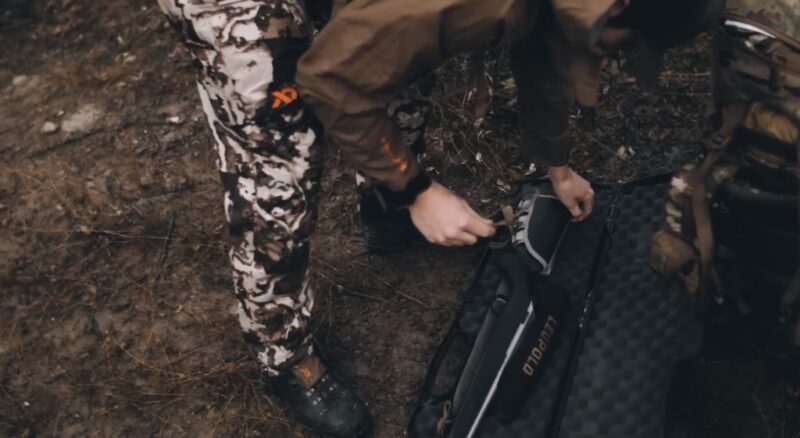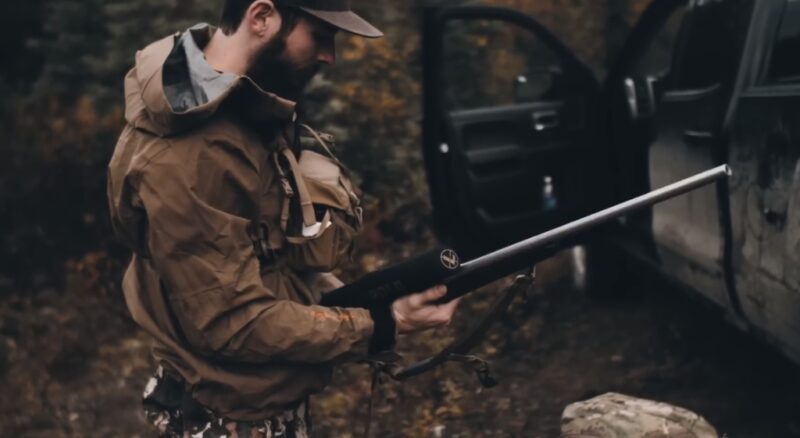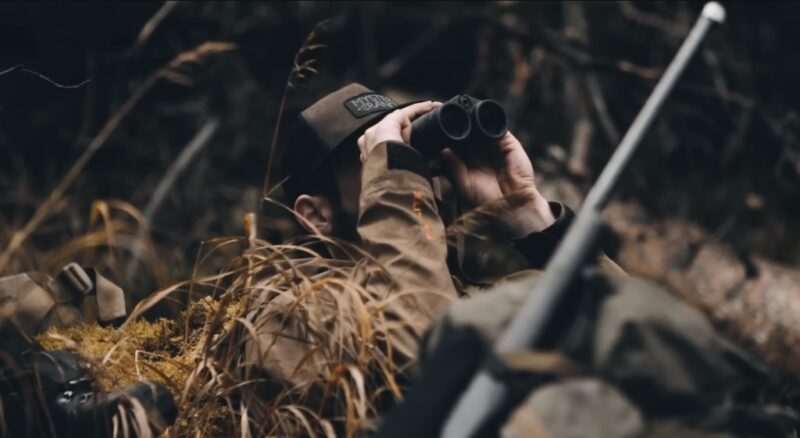Selecting your first hunting rifle is a pivotal step in your journey as a hunter. It’s a decision that must be guided by a deep appreciation for safety, adherence to legal requirements, and consideration of your personal preferences. The hunting rifle is not just a tool; it’s a symbol of your commitment to responsible and ethical hunting.
The foundation of responsible hunting is safety. Your hunting rifle must be treated with the highest regard for safety measures. Learning and practicing safe firearm handling is not an option; it’s an obligation for every hunter. Safety is not just about protecting yourself but also the well-being of those around you and the natural environment.
Hunting regulations vary by region and require strict adherence. Understanding the legal requirements for rifle ownership, including background checks, licensing, and storage, is essential. Compliance with these regulations ensures you are a law-abiding hunter and a responsible firearm owner.
The rifle you choose should align with your personal preferences and hunting goals. It’s not a one-size-fits-all decision. Your rifle should feel comfortable and intuitive to use, be suited to the type of game you intend to pursue and complement your shooting style.
This article by the online firearm community platform Arms Directory will serve as your guide, helping you navigate the path to choosing the ideal hunting rifle, and ensuring that you embark on your hunting adventures with the utmost confidence and responsibility.
Do You Need A Rifle?

Choosing the right hunting weapon is a crucial decision, and it’s not always a straightforward one. Whether or not you need a rifle depends on the type of hunting you plan to undertake and your personal preferences.
Different types of hunting—such as big game, small game, and varmint hunting—may require various tools. Let’s explore when a rifle is necessary and the advantages and disadvantages of using a rifle compared to other hunting weapons.
Big Game Hunting
When pursuing large animals like deer, elk, or bear, a rifle is often the preferred choice. Rifles provide accuracy, range, and stopping power, allowing for clean and humane kills.
The advantages of rifles in big game hunting include long-range capabilities, which increase the chances of a successful shot, and the ability to take down large animals with one well-placed round. The disadvantage, however, is that rifles can be heavy and may require more skill to handle effectively.
Small Game Hunting
For small game like rabbits, squirrels, and birds, rifles may not always be necessary. Shotguns or smaller caliber firearms can be equally effective for these types of game. The choice depends on factors such as the terrain, range, and personal preference. Small game hunting often involves more movement, so a rifle’s longer range may not be as crucial.
Varmint Hunting
Varmint hunting targets pests like coyotes, groundhogs, and prairie dogs. Rifles are commonly used due to their accuracy and range. These animals are often cautious and may require long-distance shots, making rifles the weapon of choice.
The advantage of rifles in varmint hunting is precise shots at extended distances. However, they may be overkill for smaller varmints and may cause unnecessary damage to the pelts.
What Are The Legal Requirements for Rifle Ownership?

When considering the ownership of a hunting rifle, it’s crucial to be well-versed in the legal requirements that govern the process. Regulations surrounding rifle ownership are in place to ensure the safety of individuals, promote responsible firearm usage, and prevent misuse.
Familiarizing yourself with these legal requirements is not only essential for compliance but also for ensuring a responsible and ethical approach to hunting. Here’s an overview of the key legal aspects related to rifle ownership:
Background Checks
Most regions require background checks before an individual can purchase a rifle. These checks are conducted by law enforcement agencies to assess an applicant’s criminal history, mental health, and overall eligibility to own a firearm. The purpose of background checks is to keep firearms out of the hands of individuals who pose a danger to themselves or others.
Licensing
Many areas mandate obtaining a license or permit for rifle ownership. These licenses often require applicants to complete safety training courses and pass written and practical exams. Licenses are crucial for ensuring that rifle owners are knowledgeable about firearm safety and responsible usage.
Storage Requirements
Responsible storage of firearms is a legal requirement in many regions. Proper storage typically involves keeping the rifle in a securely locked cabinet or safe to prevent unauthorized access. These measures are in place to reduce the risk of accidents and theft.
Prohibited Persons
Certain individuals are prohibited from owning firearms, including those with felony convictions, restraining orders, and individuals with a history of mental illness. The legal system restricts rifle ownership for these individuals to protect public safety.
Gun Control Laws
Beyond the specific legal requirements for rifle ownership, there are broader gun control laws that vary by region. These laws may include restrictions on the purchase of certain types of rifles, waiting periods, and limitations on magazine capacity.
Choose Your Caliber

Selecting the right caliber for your hunting rifle is a pivotal decision that directly impacts your success as a hunter and the ethical treatment of the game you pursue. Caliber refers to the internal diameter of the rifle’s barrel, which determines the size of the ammunition it can fire. There are numerous calibers available for hunting rifles, each suited to different types of game and hunting scenarios. Understanding the role of caliber in hunting is paramount to ensure a humane and ethical hunt.
Big Game
For large game like deer, elk, or bear, you’ll want a rifle with a larger caliber. Calibers such as .270 Winchester, .30-06 Springfield, and .300 Winchester Magnum are popular choices. These calibers offer ample power and accuracy for a clean and ethical harvest. They ensure quick, humane kills, minimizing the suffering of the game.
Small Game
When hunting smaller game like rabbits or squirrels, it’s advisable to opt for smaller calibers, as large calibers can cause excessive damage to the animals and render the meat less usable. .22 LR, .17 HMR, and .22 WMR are examples of calibers suitable for small game hunting. They offer the accuracy and precision required for precise shots on smaller targets.
Varmint Hunting
Varmints like coyotes and prairie dogs require a balance between accuracy and long-range capability. Calibers like .223 Remington and .22-250 Remington are well-suited for this purpose. They provide the range to take down varmints at a distance while minimizing damage to the pelts.
3 Different Types of Rifles

When it comes to choosing a hunting rifle, the variety of options available can be overwhelming. Different types of rifles are designed for specific purposes and excel in various areas. Understanding the key differences among these rifles is crucial in selecting the right one for your hunting needs. This section will outline the main types of hunting rifles, including bolt-action, lever-action, and semi-automatic rifles, and discuss their differences in accuracy, power, and usability. It will also emphasize the importance of finding a rifle that suits your shooting style and specific requirements.
1. Bolt-Action Rifles
Bolt-action rifles are renowned for their accuracy, reliability, and simplicity. They are the preferred choice of many hunters for their precision and robustness. The action of a bolt-action rifle involves manually cycling the bolt to chamber a round and preparing for the next shot. This design contributes to their exceptional accuracy. Bolt-action rifles offer:
- Accuracy: Bolt-action rifles are known for their exceptional accuracy, making them the top choice for long-range shooting and big-game hunting.
- Reliability: Their straightforward design and fewer moving parts make them highly reliable in various hunting conditions.
- Power: Bolt-action rifles are available in a wide range of calibers, providing ample power for big game hunting.
- Usability: They are easy to operate and maintain, making them suitable for both novice and experienced hunters.
2. Lever-Action Rifles
Lever-action rifles are a classic choice and hold a special place in hunting traditions. They are known for their fast cycling and nostalgic appeal. Lever-action rifles have a lever located under the stock, which, when operated, chambers a round and cocks the hammer. They offer:
- Speed: Lever-action rifles excel in follow-up shots due to their quick cycling, making them suitable for close-range hunting and fast-moving games.
- Compactness: They are often more compact and lightweight, providing ease of handling in brushy terrain or dense woods.
- Nostalgia: Lever-action rifles appeal to those who appreciate the traditional and historical aspects of hunting.
3. Semi-Automatic Rifles
Semi-automatic rifles are prized for their rapid-fire capabilities and versatility. They use the energy from fired rounds to cycle the action automatically. Semi-automatic rifles provide:
- Rapid Fire: These rifles offer quick follow-up shots, which can be advantageous when hunting multiple targets or fast-moving games.
- Versatility: Semi-automatic rifles can be chambered in various calibers, making them adaptable to different hunting scenarios.
- Reduced Recoil: The recoil of semi-automatic rifles is often more manageable, which can be advantageous for some hunters.
Choosing the right type of rifle depends on your shooting style, hunting environment, and specific needs. If you value precision and are likely to take long shots, a bolt-action rifle is an excellent choice. If you require quick follow-up shots, a lever-action or semi-automatic rifle may be preferable.
It’s important to consider factors such as the terrain you’ll be hunting in, the type of game you’ll pursue, and your level of experience as a hunter.
- Consider the Terrain: The terrain in which you plan to hunt should also influence your caliber choice. In open, long-range environments, a caliber with a flatter trajectory and longer effective range is ideal. In dense woods or brushy areas, a more compact and maneuverable rifle with a smaller caliber may be preferable.
Wrapping Up

In conclusion, selecting your first hunting rifle is a significant decision that demands careful consideration. Prioritize safety, legal compliance, and personal preferences in your choice. Understanding the type of game you’ll hunt and the terrain you’ll encounter is key.
Research and test different rifles to find the ideal fit for your shooting style and requirements. It’s crucial to be a responsible and ethical hunter, adhering to the highest standards of safety, compliance, and conservation. The journey begins with the right rifle, but it’s the values you bring to the field that define your legacy as a hunter.
I’m Annabel, and traveling has always been my passion. My idea of fun? A lot of biking and hiking. From the Himalayas to the local hills, if there’s a path (or not), I’ve probably been there or it’s on my list.







